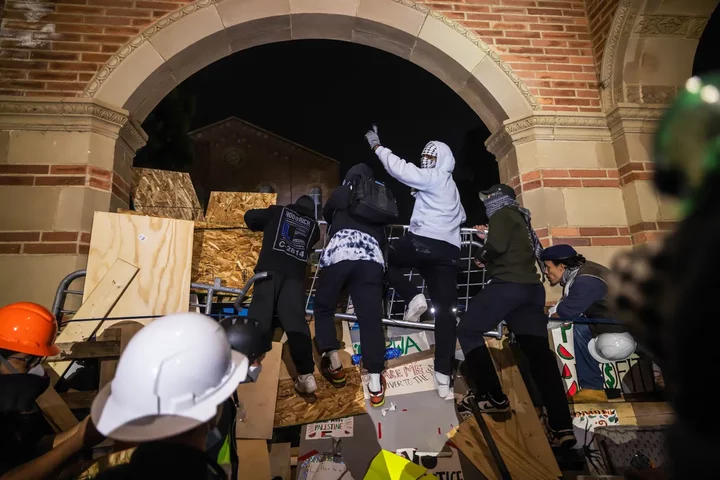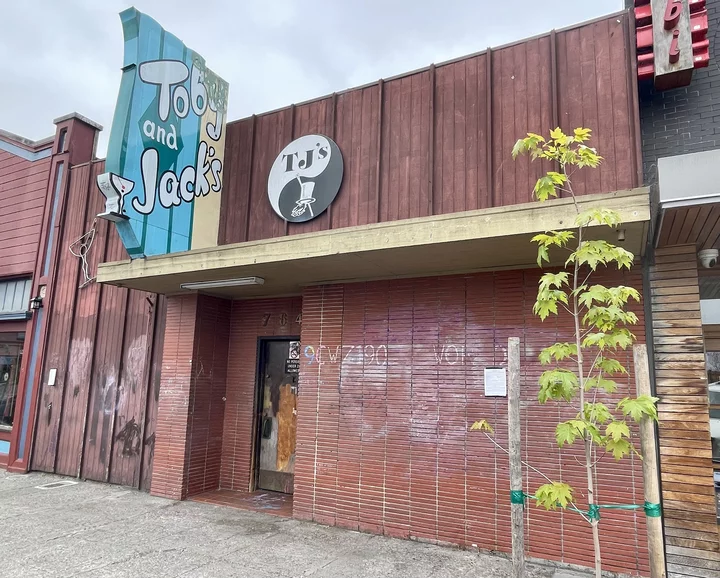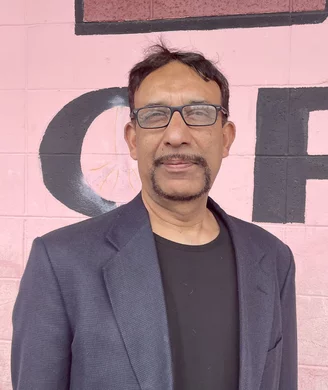California Republicans Want to Take Financial Aid From Protesters if They Were Violent
Alexei Koseff / Friday, May 3, 2024 @ 7:39 a.m. / Sacramento
Groups of pro-Palestinian protesters gather at an entrance to their encampment at UCLA on the late evening of May 1, 2024. Law enforcement would eventually clear the encampment on the morning of May 2, 2024. Photo by Ted Soqui, CalMatters
As campus tensions escalate over student encampments to protest the war in Gaza — with canceled classes, violent clashes and mass arrests in recent days — Republican leaders in the California Legislature are calling for the state to use its upcoming budget process to punish demonstrators who they say have gone too far.
Senate Republican Leader Brian Jones of San Diego and Assembly Republican Leader James Gallagher of Chico announced Thursday that they would push to strip state financial aid from protesters found to have committed violent or criminal acts or violated other students’ rights.
They did not offer a formal proposal with details, but Jones and Gallagher said at a press conference that students who assault, harass and intimidate their peers or physically block them from attending class — as reportedly happened to Jewish students at UCLA this week — did not deserve to benefit from the Cal Grant program.
“You have to earn those,” Jones said. “We ought to be rewarding the students that want to use those Cal Grants to go to school, get educated and become productive members of society.”
Jones and Gallagher focused their ire on pro-Palestinian demonstrators, whose aggressive tactics they said have left Jewish students feeling unsafe and completely derailed some campuses, including Cal Poly Humboldt, which closed for the rest of the semester after protestors occupied an academic and administrative building. They largely sidestepped the attack earlier this week by pro-Israeli counterdemonstrators on the encampment at UCLA, which was dismantled by police Thursday morning.
“No violence should be condoned at all,” Gallagher said. “But let’s be clear, there was violence on both sides.”
The Republican leaders blamed university administrators across the state for not shutting down encampments sooner and Gov. Gavin Newsom for not intervening. They said they would also seek to withhold funding in the upcoming budget from University of California and California State University campuses that did not respond adequately to the protests — perhaps an amount equal to state resources spent on providing law enforcement and cleaning up damage.
“It’s outrageous and it’s unacceptable that we’ve allowed this chaos to ensue over weeks,” Gallagher said. “There does need to be accountability. Some people need to be fired.”
Any budget plans will require support from the Legislature’s Democratic majority, which did not immediately jump on board with Jones and Gallagher’s ideas.
Assemblymember Jesse Gabriel, an Encino Democrat who leads the Assembly budget committee and serves as co-chairperson of the California Legislative Jewish Caucus, said he did not want to comment until he saw their proposals.
“These campuses are going to have to figure out how to move forward in a way that works for everybody,” Gabriel said. “That’s a difficult question and certainly something we’re doing a lot of thinking about.”
A spokesperson for Newsom’s office declined to comment but noted that the state has established a mutual aid system to provide additional law enforcement when college campuses request assistance. He provided a previous statement from the governor affirming that “those who engage in illegal behavior must be held accountable for their actions — including through criminal prosecution, suspension, or expulsion.”
###
The CalMatters Ideas Festival takes place June 5-6! Find out more and get your tickets at this link.
CalMatters.org is a nonprofit, nonpartisan media venture explaining California policies and politics.
BOOKED
Today: 6 felonies, 7 misdemeanors, 0 infractions
JUDGED
Humboldt County Superior Court Calendar: Today
CHP REPORTS
No current incidents
ELSEWHERE
RHBB: PG&E’s Match My Payment Bill-Pay Program Extended, Funds Are Limited
RHBB: Trinity County Reservoir Release and Flow Changes
Governor’s Office: Governor Newsom honors fallen Oxnard Police Department Commander
Shuttered Arcata Plaza Tavern Toby & Jack’s Set to Become Habibi Bar & Grill, Featuring Indian, Pakistani and Mediterranean Food With Cocktails and Theme Nights
Ryan Burns / Thursday, May 2, 2024 @ 4:23 p.m. / Business
Shuttered since 2020, Arcata Plaza bar Toby & Jack’s has continued to deteriorate. | Photo by Ryan Burns.
###
Even for a dive bar, Toby & Jack’s is looking nasty these days.
The exterior is smeared with partially removed graffiti. The pinstriped teal-and-beige marquee has faded, and the neon martini glass affixed to the plywood siding has gone dark.
The illustrated top hat, cane and gloves superimposed on the yin-yang “TJ’s” sign above the door suggest long-lost aspirations of elegance, which can only look ironic affixed to such a ramshackle facade.
As with Sidelines Sports Bar, the former Arcata Plaza tavern located two doors down, Toby & Jack’s was raided by law enforcement in February of 2018 following a 10-month undercover investigation into illegal drug dealing. (During a subsequent administrative hearing, a prosecutor with the California Department of Alcoholic Beverage Control quipped that while Cheers was the place where everybody knows your name, Toby & Jack’s was where everyone went for cocaine.)
Both bars had their liquor licenses revoked in 2020 following a series of appeals and administrative hearings, and they subsequently went out of business.
Sidelines later reopened as a thrift store, with revenues benefiting Miranda’s Rescue, but Toby & Jack’s has remained closed.
But Toheed Ahmad and his sister Maria Khalid, who immigrated to the Bay Area from Pakistan in the late 1990s, have plans to revitalize the building over the coming months, renovating it inside and out to create Habibi Bar and Grill. Once open, the restaurant will offer cuisine from India, Pakistan and the Mediterranean region while the full bar will serve cocktails, hard alcohol, beer, wine and more into the wee hours.
Conceptual design for the facade of Habibi Bar and Grill by Brown Designs. | Image via City of Arcata.
###
The Outpost recently sat down with Ahmad in his small office at Arcata’s Fourth Street Market, Liquors and Deli, the salmon-colored landmark on Samoa Boulevard that he has owned and operated since 2004.
“I bought it from the Dal Porto family,” Ahmad said, referring to the multi-generational locals who opened Dal Porto’s Deli here in 1979. Ahmad, who had been managing a similar business in the San Jose suburb of Mountain View, purchased the business in 2004.
“We have a deli here, too,” he explained.
It was his sister, though, who had dreams of opening a sit-down dining establishment.
“She’s the one who said, ‘Okay, brother, let’s move into the restaurant’ – because she’s a good cook,” Ahmad said.
Last week, the Arcata Planning Commission approved a sign permit and design review for the building’s facade, which will be renovated with a black lattice design over white background and a cut-metal sign backlit by red LED lighting.
“I want to uplift that building, make it beautiful [and] increase the cleanliness of the plaza,” Ahmad said.
The floor plan, again by Brown Designs. (Click to enlarge.)
###
The plans submitted to the city depict a covered outdoor dining area facing the alley. Inside the train car-shaped dining area will be a long bar, a dining counter and tables, with a row of five skylights overhead.
Ahmed said the vibe will be a mix of casual and fine dining featuring classic Indian dishes (curried, lamb, chicken, goat, etc.), a variety of spinach-based and other vegetarian dishes, pani puri, mixed vegetables, dal and “definitely some barbecue,” including fish, lamb, beef and chicken.
“It will be nice for the community to have different kinds of food, because I didn’t see any – in all Arcata – any Indian restaurant or Mediterranean restaurant fine dining. So that will be good.”
Ahmed and his sister plan to serve food until 9 or 10 p.m. but keep the bar open longer.
“We will stay open late [and have] different cultural nights,” Ahmad said. “We’ll have Bollywood night, Arabian night [and other] theme nights. So it will be a little different for the students; the university is expanding. Diversity, different kinds of food, a different kind of culture – that’s what my idea is.”
With a hard alcohol license already acquired, Ahmad has a few more bureaucratic and logistical hoops to jump through, including city approval for the building redesign, cleanup, construction and more. He intends to keep running Fourth Street Market and hopes to open Habibi Bar and Grill by the end of the year or early next year.
State Officials Close Humboldt County’s Recreational Razor Clam Fishery Again Due to Domoic Acid Toxicity
LoCO Staff / Thursday, May 2, 2024 @ 12:53 p.m. / Public Safety , Wildlife
Photo via CDFW.
###
Press release from the California Department of Fish and Wildlife:
The California Department of Fish and Wildlife (CDFW) Director Charlton H. Bonham has closed the recreational razor clam fishery in Humboldt County following a recommendation from state health agencies determining that consumption of razor clams in the area poses a significant threat for domoic acid exposure.
Pseudo-nitzschia, a naturally occurring, single-celled marine alga, produces the potent neurotoxin domoic acid under certain ocean conditions. Bivalve shellfish, like clams and mussels, accumulate the toxin without being harmed. In fact, razor clams are known to bioaccumulate domoic acid, meaning it may not clear their system until long after the ocean conditions that caused it have abated.
Sampling of razor clams from Clam Beach in Humboldt County in late April (PDF) found clams exceeding the current federal action level for domoic acid of greater than or equal to 20 parts per million.
Domoic acid poisoning in humans may occur within minutes to hours after consumption of affected seafood and can result in signs and symptoms ranging from vomiting and diarrhea to permanent loss of short-term memory (Amnesic Shellfish Poisoning), coma or death. There is no way to prepare clams for consumption that will remove the toxin – cooking and freezing have no effect.
The recreational razor clam fishery in Del Norte County remains closed due to elevated levels of domoic acid. The closure, which began in November 2023, will remain in effect until state health agencies determine razor clams no longer pose a health risk.
CDFW will continue to work with the California Department of Public Health (CDPH) and Office of Environmental Health Hazard Assessment to collect, monitor and analyze razor clams to determine when the recreational razor clam fishery can be reopened safely in these areas.
For more information on any fishery closure or health advisories, please visit: www.wildlife.ca.gov/Fishing/Ocean/Health-Advisories.
To get the latest information on current fishing season closures related to domoic acid, please call CDFW’s Domoic Acid Fishery Closure Information Line at (831) 649-2883.
For the latest consumption warnings, please call CDPH’s Biotoxin information Line at (510) 412-4643 or toll-free at (800) 553-4133.
###
PREVIOUSLY in clam closures:
Flight Delayed Four Hours Last Night Due to TSA Scare
LoCO Staff / Thursday, May 2, 2024 @ 7:35 a.m. / Airport
Press release from the County Administrative Office:
The terminal and security checkpoint at the California Redwood Coast Humboldt County Airport (ACV) were closed at approximately 3:45 p.m. today, Wednesday, May 1, due to a security concern related to a suspicious item in a passenger’s luggage. This temporary closure was in place out of caution while Transportation Security Administration (TSA) agents and the Humboldt County Sheriff’s Office investigated the issue.
Safety is ACV’s first priority. While the investigation was conducted the airport airfield (runways and taxiways) remained open as a safety buffer was established. There was one airline delay as a result of this matter.
At approximately 7:30 p.m. the Humboldt County Sheriff’s Office determined that the suspicious item was cleared and there is no cause for further concern. The terminal and security checkpoint reopened at 7:45 p.m.
The Humboldt County Department of Aviation would like to thank the community for their patience while the investigation took place. The Department of Aviation extends its utmost gratitude to the TSA, Federal Aviation Administration (FAA) and Humboldt County Sheriff’s Office for their prompt response.
For more information on the California Redwood Coast-Humboldt County Airport, please visit FlyACV.com.
UC’s President Had a Plan to Deescalate Protests. How Did We Get a Night of Violence at UCLA?
Atmika Iyer / Thursday, May 2, 2024 @ 7 a.m. / Sacramento
Video footage of the attack by counterprotesters against pro-Palestinian protestors at UCLA in the early morning of May 1, 2024. CalMatters reporter Sergio Olmos captured the confrontation for about two hours. For the first hour, police officers did not intervene. Video by Sergio Olmos, CalMatters
As counterprotesters tore at barricades, threw fireworks, and beat and pepper sprayed pro-Palestine protesters at UCLA overnight Tuesday, no law enforcement officers took action to stop the violence or made any arrests. In stark contrast, by tonight, UC Police declared that anyone who remains in the “unlawful” encampment would be arrested.
The reason for such a mixed response from law enforcement: haphazard adherence to UC President Michael Drake’s 2021 UC Campus Safety Plan.
Encampments at a growing number of universities across the state and nation are sparking battles between students’ free speech and campus policies against trespassing and obstructing operations. For the University of California system, the encampments at five campuses are a test of newly implemented campus policing reforms meant to address systemic racism post-2020.
Drake’s safety plan states: “The University will reinforce existing guidelines that minimize police presence at protests, follow de-escalation methods in the event of violence and seek non-urgent mutual aid first from UC campuses before calling outside law enforcement agencies.”
The plan was designed to deter potential violence — and reduce a police role in campus protests. But now, people are questioning why law enforcement did not break up any of the physical assaults or otherwise intervene as violence escalated at the Los Angeles campus. According to a statement Drake released today, there were at least 15 injuries and one hospitalization.
The UC president has ordered a review of UCLA’s “mutual aid response” and UCLA Chancellor Gene Block said he plans to “dismantle (the encampment) at the appropriate time.”
“My office has requested a detailed accounting from the campus about what transpired in the early morning hours today,” Block said today. “But some confusion remains. Therefore, we are also ordering an independent external review of both UCLA’s planning and actions, and the effectiveness of the mutual aid response.”
UC lecturers were quick to call for Block’s resignation, citing the mismanagement of police and security response to the overnight violence.
“Chancellor Block has refused to meet with protesters to discuss their interests; instead he has created an environment that has escalated tensions and failed to take meaningful action to prevent the violence that occurred last night,” the UC lecturers’ statement read.
Counterprotesters began setting off fireworks around 10:30 p.m., and later, armed with pepper and bear spray, physically attacked those residing in the pro-Palestine encampment. During this time, university-hired, unarmed security guards and campus public safety aides watched the scene but did not stop the attacks. By about 1:30 a.m., Los Angeles Police and the California Highway Patrol arrived, after the chancellor called them to assist security guards and UC police. The officers did not break up the violence. Instead, they advanced a line every few minutes to push the counterprotesters out of the area. Some of the counterprotesters who remained, however, continued their assaults.
At about 4 a.m., a small group of student journalists for the Daily Bruin, including Christopher Buchanan, a student fellow for the CalMatters College Journalism Network, were confronted by a group of counterprotesters who began berating them. They targeted the staff’s news editor, calling her names, and blocked the journalists’ route to the Daily Bruin office. One shined a strobe light into Buchanan’s face while others attacked him as he fell to the ground.
“After I was struck and debilitated, I was surrounded by four to seven counterprotesters who proceeded to punch and kick my head and torso for thirty seconds to a minute,” Buchanan said. “I didn’t sustain any internal injuries, but I was badly bruised on the body and face.”
Buchanan said this all happened within earshot of CHP officials, who did nothing to intervene.
Students and government officials are decrying UCLA’s response. UCLA refused to provide interviews or answer questions about their policing response.
California Assemblymember Rick Chavez Zbur, a Democrat whose district includes UCLA, issued a statement condemning the violence against pro-Palestine protesters.
“The horrific acts of violence against UCLA students and demonstrators that occurred on campus last night are abhorrent and have no place in Los Angeles or in our democracy,” Zbur said. “No matter how strongly one may disagree with or be offended by the anti-Israel demonstrators’ messages, tactics, or goals, violence is never acceptable and those responsible must be held accountable.”
In the past few days, UC Irvine and UCLA have declared their campus encampment protests illegal and in violation of the state education code against non-UC use of university property. Many pro-Palestine student advocates see this position as an attempt to disrupt their advocacy.
In responding to the encampments, the UC, unlike some universities, has avoided an aggressive law enforcement response. Police have not arrested anyone or used tear gas. The UC Campus Safety plan, however, has not been uniformly followed at each campus.
UC Irvine appeared to ignore the campus safety plan. When an encampment was erected on April 29, the university immediately called in the UC police department, the Orange County Sheriff’s Department, and the police forces of Irvine, Costa Mesa and Newport. Officers in riot gear barricaded the encampment entrance.
UC Irvine spokesperson Tom Vasich described the decision to involve five law enforcement departments as “a standard response” for situations where the campus needs support while simultaneously describing the protest as a “very peaceful environment.” He attributed the police response to potential trespassing violations from people not affiliated with the university.
“This isn’t a free speech issue, this is a trespassing issue,” Vasich said.
Sara, a UC Irvine student studying psychological sciences who only gave her first name in fear of retaliation for participating in the protest, said that at around 9 a.m. on Monday, law enforcement prevented students from entering the encampment and giving protesters water.
Despite police pushback, she said students and bystanders later created barricades around their encampment, allowing students to enter the area and receive supplies. “The students here all know the risks,” Sara said. “But regardless, they stood their ground and will continue to stand their ground until our demands are met.”
UC Irvine Chancellor Howard Gillman said in a Monday night statement that police would no longer engage with the protesters, and hours later police cleared out. Gillman promised to work with students to find a different location “that is appropriate and non-disruptive.”
How the UC plan is supposed to ensure safety
The UC Campus Safety Plan is being put to the test amid heightened tensions between pro-Palestine groups calling for the UC to financially divest from companies with ties to Israel, and pro-Israel groups counterprotesting and calling the actions of those in the encampments anti-semitic.
The UC Office of the President released a statement on April 26 rejecting demands for divestment.
“The University of California has consistently opposed calls for boycotts against and divestment from Israel,” the statement said. “While the University affirms the right of our community members to express diverse viewpoints, a boycott of this sort impinges on the academic freedom of our students and faculty and the unfettered exchange of ideas on our campuses.”
President Drake’s office refused multiple requests from CalMatters to answer questions about UC’s response to campus encampment protests.
The UC’s policing reforms came after the system faced several high-profile instances of excessive force in response to student advocacy on campuses. In 2011, the Occupy Wall Street protests at UC Davis drew international attention when peaceful activists were pepper sprayed by the university’s police department. In the end, students won a $1 million settlement from UC Davis.
In 2020, racial justice organizations and Black student unions at the UC’s nine undergraduate campuses led protests over the police-custody murder of George Floyd, and to cast a light on other Black Americans killed by law enforcement officers.
Their activism elevated negative experiences that some students of color reported with campus police. Students and employees demonstrated against racial profiling and a lack of police transparency. Some pushed for reforms; others called for abolishing police on university campuses.
The 2021 safety plan instituted data dashboards, police advisory boards, mental health responders and professional accreditation for individual police departments. According to the UC’s director of community safety Jody Stiger, all 10 campuses are expected to put the plan into action — with the final, delayed step being professional accreditation for campus law enforcement agencies — by the end of this year.
The UC Cops Off Campus Coalition, composed of UC students and faculty, has criticized the safety plan for not acknowledging the structural biases of police forces, and only increasing the scope of policing power.
UC Riverside Black Studies professor and faculty coalition member Dylan Rodríguez described the Campus Safety Plan as largely reactionary. He said it is the UC’s attempt to quell a push for police abolition in the wake of the UC’s own crises and Floyd’s murder.
“It’s a response to a period of time in which there are deep questions, fundamental and abolitionist questions, about whether campuses should have fully armed, militarized and, sometimes, riot-gear equipped and SWAT team-trained police officers on their campuses,” Rodríguez said.
The stated aim of UC’s tiered response is to use several non-sworn responders in calls for emergencies that don’t require police. Relying on alternatives to police allows campuses to respond to students in crisis who require mental health support or intervention. The plan also establishes public safety officers to patrol residence halls on foot, escort students across campus at night, provide security for events and diffuse unsafe behavior.
In an interview with CalMatters before this week’s violence, Stiger praised the increase of unarmed security guards and guidance against a police presence at protests. Police were not called to the scene during recent labor strikes, nor for earlier protests on both sides of the Gaza war.
“In almost a majority of those on every campus, you don’t see any police. You might see maybe one or two that are just in the area, but you don’t see a major police presence,” Stiger said.
Protests Escalate on UC Campuses
Late Tuesday, the university delivered a formal letter to UCLA’s Divest Coalition declaring the encampment an unlawful assembly in violation of campus policy. Chancellor Block put out a statement saying the university removed demonstrators’ barricades blocking entrances to specific buildings, and warned that students could face suspension or expulsion.
Campus police chiefs at UC Berkeley, UCLA and UC Irvine refused several requests for comment from CalMatters.
The UC Student Association — systemwide student representatives — published a statement on April 29 in solidarity with students protesting for “Free Palestine” and condemning the law enforcement response.
“We demand that the UC, at a minimum, allow students to exercise their freedom of speech,” the statement read. “We denounce any use of police force to silence us.”
###
Christopher Buchanan, Li Khan and Hugo Rios contributed to this story. All authors are fellows with the College Journalism Network, a collaboration between CalMatters and student journalists from across California. CalMatters higher education coverage is supported by a grant from the College Futures Foundation.
The CalMatters Ideas Festival takes place June 5-6! Find out more and get your tickets at this link.
CalMatters.org is a nonprofit, nonpartisan media venture explaining California policies and politics.
OBITUARY: Anthony David Maillelle Painter, 1988-2024
LoCO Staff / Thursday, May 2, 2024 @ 6:56 a.m. / Obits
Anthony David Maillelle Painter
1988-2024
Athasbascan Native
Anthony was born in Bethel, Alaska. He lived his whole life in EurekA. He passed away unexpectedly on April 27, 2024 to begin his journey.
He was a very happy joyful person and a gifted artist.He loved fishing with his family on the Klamath river. He enjoyed tattooing friends and family.
He was the son of Matthew and Susan Painter. The brother of Darla Marshall (Emil), Susie Astor (Mick), Robert McGahey, Anita Crutchfield, Misty Watkins, and Pride Painter.
He also leaves behind his birthmother, Sharon Painter of Fairbanks, Alaska. Brothers and sisters, Jeffrey Painter, Bradley Painter, Desirie Painter and Sherri Painter of Fairbanks, Alaska.
A viewing to say goodbye will be held at Paul’s Chapel on May 6, 2024 at 10 o’clock. Directly after will be a burial ceremony for Anthony at the Trinidad Cemetery.
Pallbearers: Pride Painter, Matthew Swanson (mattkat), Peter Norton, Lonnie Dean, Richard Dean, Alkenny Dean, Delmar Allen Jr, Jeffrey Painter, Bradley Painter, Joe Marshall, Jude Marshall, Robert Woods, Sebastian Swanson, Ramiro, Calvin, Daniel, David Gonzales.
###
The obituary above was submitted on behalf of Anthony Painter’s loved ones. The Lost Coast Outpost runs obituaries of Humboldt County residents at no charge. See guidelines here.
(VIDEO) News Station Releases Livestream Footage of the Moment Reporter Was Taken Into Custody During Occupy Cal Poly Humboldt Raid
Andrew Goff / Wednesday, May 1, 2024 @ 4 p.m. / Activism , News
KRCR reporter Ademi Ruiz is loaded into a police van after her arrest Tuesday morning | File
All sides involved are still processing the events of the past week after the Occupy Cal Poly Humboldt’s presence on campus was ended early Tuesday morning by a multi-agency show of force that ended in 32 arrests, at last count.
On Wednesday, Cal Poly Humboldt released the breakdown of those arrests:
- 13 students
- 1 faculty member
- 18 non-students
Notable among those non-students — as we noted in our initial eye-witness report Tuesday morning — was Adelmi Ruiz, a Eureka bureau reporter for television station KRCR out of Redding. Ruiz arrest has raised eyebrows since, as a member of the press, she was doing her job by covering the high-profile law enforcement operation. Strengthening that case is the fact that Ruiz was livestreaming to her station’s social media accounts at the time she was detained and placed in flex cuffs by officers.
Earlier today, KRCR posted the video from Ruiz’s livestream, which you can watch below.
In the clip below, hear Ruiz speak with her KRCR colleague Mike Mangas about her experience on campus and the treatment she received from law enforcement, including Humboldt County Sheriff William Honsal, during her arrest.
The Outpost has reached out to KRCR seeking a response to Ruiz’s arrest. We will update when we hear back. Ruiz herself got back to us, though. “The only thing I have to say is that it was a very upsetting experience but I am grateful for the Humboldt County Sheriff’s Office who acted quickly to get me out of jail,” she said.








